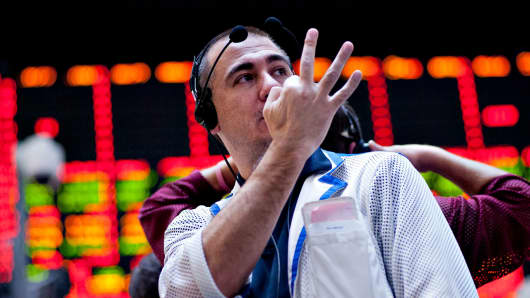The euro's been on a roll, thanks partly to hopes for the Greek debt negotiations. Here's how to trade on a deal.
With all the negative sentiment surrounding the euro and the euro zone, the currency's rise has been impressive. Of course, the ongoing talks between Greece and its creditors are helping raise investors' hopes — but the big question is what to do if a deal is struck.
The short answer from several pros: sell.
Andrew Busch, global currency and public policy strategist for BMO Capital, actually thinks the Greek negotiations could drag on into March, when Greece has a big bond payment due. He is also concerned about Portugal, which is being forced to pay ever higher rates in the bond markets, so he suggests selling now.
Busch would enter the trade right around 1.3185 with a stop at 1.3285 and a target of 1.2885. (Investors who would rather wait for a potential rise on news of a Greek deal can just adjust the trade levels to reflect the same three-to-one ratio of target to stop, he told me.)
Simon Derrick, chief currency strategist for Bank of New York Mellon, told me he thinks the prospect of a Greek deal "is to a large extent baked in." So he doesn't see much upside for the euro — and he is concerned about the prospect of ongoing tension between Greece and Germany over economic sovereignty, along with "how to deal with EUR 15 billion gap reportedly identified in the bailout deal."
Rather than wait for a specific euro level to sell, though, Derrick is watching Portuguese debt. "Worries about a Greek default will likely hit there first," he says.
Some think the euro has a bit more room to rise. Amelia Bourdeau, director of foreign exchange at Westpac Institutional Bank, told CNBC she wants to sell the euro — after a deal with private sector investors, or PSI, is inked. "I think we'll get a bounce when the PSI is announced, and then I would short it up around the 1.34 level," she says.
Your move.
---------------------
MULTI CURRENCIES v The Dollar
Tune In: CNBC's "Money in Motion Currency Trading" airs on Fridays at 5:30pm and repeats on Saturdays at 7pm.
Learn more: The essential vocabulary for currency trading is on Key Terms Dictionary. Top currency strategies are broken down for you in Currency Class.
Talk back: Tell us what you want to hear about - email us at moneyinmotion@cnbc.com.



